Ayatollah Ali Khamenei, Iran’s Supreme Leader, announced that the ongoing conflicts in Gaza and Lebanon have resulted in the deaths of 50,000 people over the past year, predominantly among women and children. He criticized the United States for its support and involvement in these conflicts, framing it as a violation of human rights.
On November 2, 2024, Iranian Supreme Leader Ayatollah Ali Khamenei made a grave announcement via a post on the social media platform X (formerly Twitter), asserting that the ongoing hostilities in Gaza and Lebanon have resulted in the deaths of approximately 50,000 individuals over the past year. He emphasized that the majority of these casualties were women and children, questioning the magnitude of such a loss by stating, “Is this a small matter?” Furthermore, he accused the United States of not only advocating for human rights but also complicit in the violence, claiming that the strategies and weaponry used in these conflicts are supplied by the U.S. Khamenei’s statements come amidst escalating tensions in the region, which have seen military engagements, including recent airstrikes in Beirut and increased casualties reported from the Israeli defense forces operating in Gaza.
The current situation in Gaza and Lebanon has been marked by significant casualties and ongoing military conflict, notably involving Israel and various militant groups. The international community remains divided regarding the conflict, with accusations of human rights violations coming from different factions. Khamenei’s remarks reflect Iran’s condemnation of U.S. involvement in the Middle East, which it perceives as an exacerbating factor in the humanitarian crisis affecting civilians in the region.
Ayatollah Khamenei’s declaration of 50,000 deaths due to conflicts in Gaza and Lebanon highlights the pressing humanitarian issues associated with these ongoing hostilities. His criticisms of U.S. involvement underline the geopolitical tensions that shape regional dynamics. The statement not only aims to draw attention to the tragedies faced by many innocent civilians, particularly women and children, but also serves to rally support against perceived external aggressions that contribute to the conflict.
Original Source: www.jpost.com




